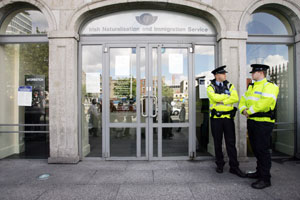7 August 2008 Edition
UN criticises human rights failures

Garda National Immigration Bureau
The United Nations Human Rights Committee has identified a number of areas in which the 26-County state is failing to meet its obligations under the UN International Covenant on Civil and Political Rights.In its Concluding Observations to the Third Periodic Report on the State’s Compliance with the Covenant, the committee calls on the Government to “carefully monitor” the continued existence of the Special Court “with a view to abolishing it”. It noted that Article 28.3 of the 1937 Constitution – which gives the Government wide latitude to enact repressive legislation on “emergency’ grounds” – exceeds the Covenant’s strict limitations on this power.
The committee also expressed concern about state policies affecting women, ethnic and religious minorities and the Lesbian, Gay, Bisexual and Transgender (LGBT) community.
Religious domination of the primary schooling sector was noted, with a recommendation that the state increase efforts to ensure availability of non-denominational education.
Provisions in the Immigration, Residence and Protection Bill 2008, which allow for summary deportation and restrict access to legal representation, were criticised. The committee urges the Government to amend this section of the bill in line with the Covenant’s requirements. It also expressed concern about the lack of independence of the proposed Protection Review Tribunal and the use of prisons for immigration violations.
The Government is scolded for its failure to include members of the Travelling community in its High Level Group on Travellers’ Issues and its ongoing refusal to recognise Travellers as an ethnic group.
CIVIL PARTNERSHIP
The committee calls for the addition of taxation and social welfare to the new Civil Partnership Bill and for transgender persons to be granted new birth certificates.
While acknowledging progress made toward gender equality, the committee notes that traditional attitudes towards women remain officially sanctioned in the state’s constitution. It also expresses concern about the “highly restrictive circumstances” under which a woman may have an abortion.
The Government has between one and four years to report on its implementation of the recommendations.
